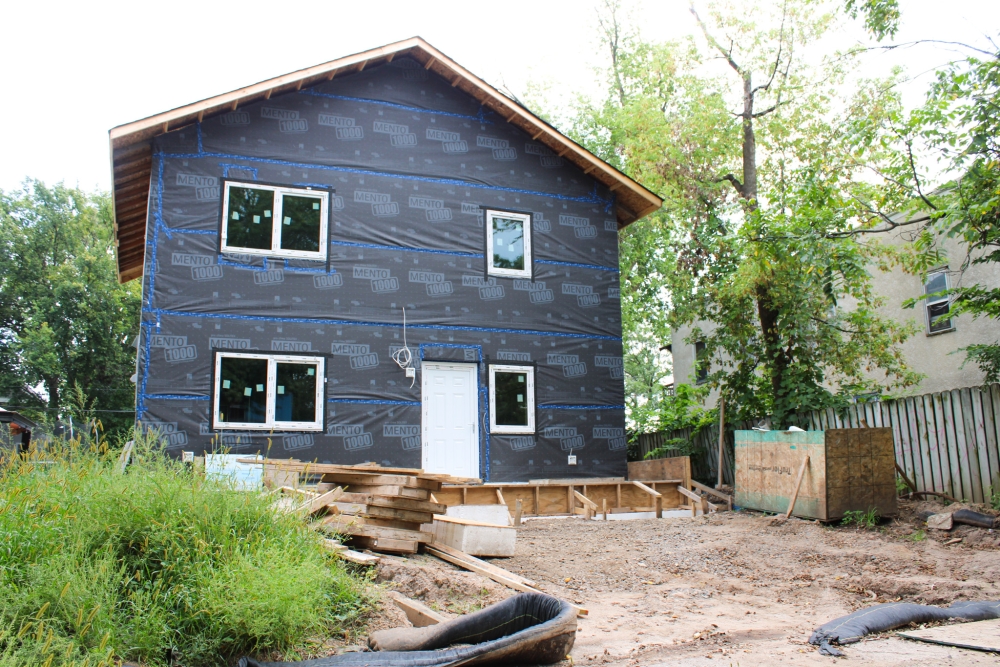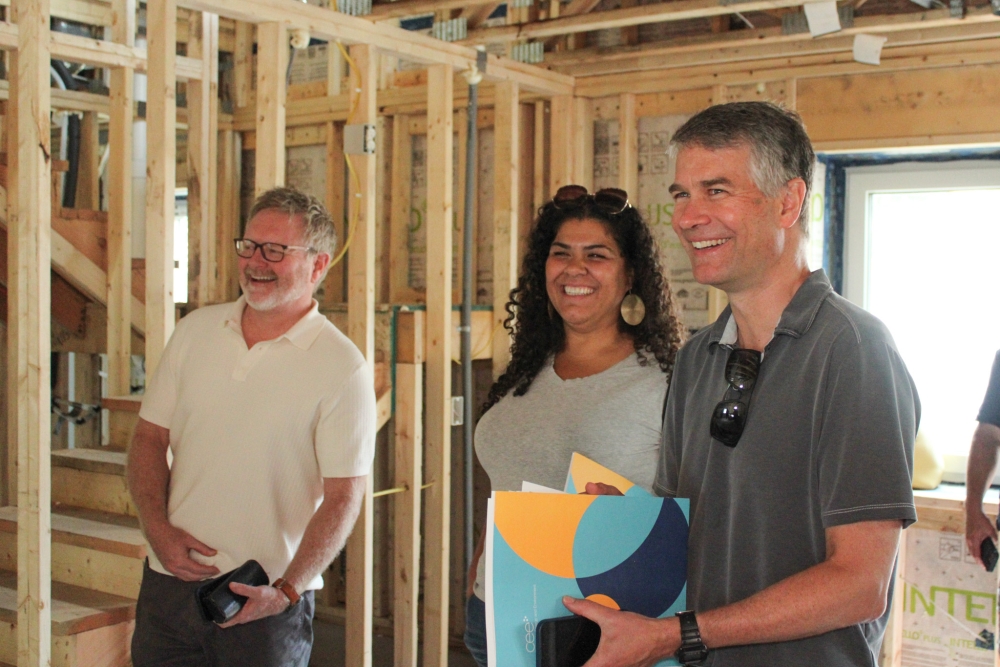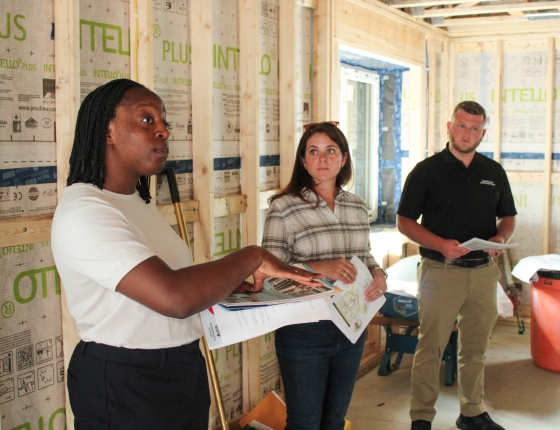On Thursday, Sept. 5, staff from CEE's policy and new homes teams joined with Urban Homeworks to offer state legislators a tour of an innovative new project: one of the very first single-family Phius-certified affordable housing projects in Minnesota.
The all-electric home, located on Bryant Avenue in north Minneapolis, is being developed by Urban Homeworks, which works to advance housing justice through accessible homeownership, affordable rentals, and advocacy. Construction on this home is being completed by The Fortress Project. There are five homes of this design being constructed currently, three by The Fortress Project and two by JR Remodelers and Builders.
In place of a traditional air conditioning unit and furnace, the house has a cold climate air source heat pump, which offers significantly greater energy efficiency. Other highlights of the home include a heat pump water heater, air tightness nearly four times tighter than that of a code home, exterior walls with nearly three times the insulation of a code home, triple-pane windows that are over twice as efficient as a code window, and efficient ERV continuous ventilation.

The home, set to become one of the first Phius-certified single-family affordable housing projects in the state, is located on Bryant Avenue in North Minneapolis.

Brian Halloran, a policy advisor for CEE, left, stands with Rep. Athena Hollins, middle, and Rep. Larry Kraft inside the new passive home.
To help the project achieve Phius certification, qualifying it as a passive home, Tony Beres, senior rater at CEE, has completed energy modeling and numerous site visits to inspect framing and insulation, conduct duct leakage testing and a blower door test, and more. Beres is also leading the process of submitting certification documents to Phius. Elizabeth Turner of Precipitate Architecture is the architect and Certified Passive House Consultant on the project and also performed the detailed WUFI passive building energy modeling.
Aly Eilers, CEE’s manager of legislative affairs, led the tour alongside Phil Anderson, CEE’s new homes manager, and staff from Urban Homeworks: Azad Lassiter, real estate development project manager, and Temi Ogunrinde, equity and engagement director.
Rep. Larry Kraft (46A) and Rep. Athena Hollins (66B) attended the tour to learn about the project’s innovative energy efficiency features, many of which were enabled by the 2021 ECO Act (ECO). ECO replaces and builds on Minnesota’s Conservation Improvement Program, which provided decades of meaningful savings in energy and customer costs. The ECO Act accounts for more flexible and efficient load management to handle a greater number of residents electrifying their household appliances and incentivizes fuel switching and electrification through increased efficiency choices and specialized rates for advanced technologies like air source heat pumps.
Both Rep. Kraft and Rep. Hollins serve on the House Climate and Energy Finance and Policy Committee, with Kraft in the role of vice chair. Reps. Kraft and Hollins provided enthusiastic support for two updates to the ECO Act, made in 2023 and 2024, which expanded eligibility and reduced administrative burdens in the application process.
“Rep. Kraft and Rep. Hollins are championing clean energy at the capitol, and this tour allowed us to show them what that work is helping to bring to life,” Eilers said.
"I came away from the passive house tour excited and hopeful,” Rep. Kraft said. “Urban Homeworks, CEE, and their partners are showing that housing built to be affordable and extremely energy efficient is also healthier to live in, has far lower monthly bills, and is more durable. Let’s do more of this!"
Once completed, the Bryant Avenue home will be available to low- and middle-income first-time buyers. Its future owners will be eligible for over $20,000 in rebates from Xcel Energy made possible by ECO. The rebates will be provided for the house’s air source heat pump, Energy Star refrigeration, electric clothes dryer, and smart thermostat. “In Minnesota, communities of color experience the impacts of pollution and climate change first and hardest — north Minneapolis has the highest rates of asthma hospitalizations in Minnesota, nearly five times the average,” Azad Lassiter, real estate development project manager at Urban Homeworks, said. “Lower-income households also experience the burden of energy costs at disproportional rates compared with the rest of Hennepin County. Passive homes are not only safer and healthier, with better indoor air quality, but they also provide better long-term affordability and stability for buyers. Passive homes are part of the solution for increased climate equity.”
“This collaborative project goes to show that we can make innovative, efficient homes available for everyone — especially those who need them most — with the right community partners to develop them, build them, and make them affordable and attainable,” Eilers said.
